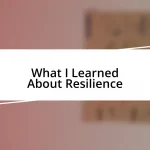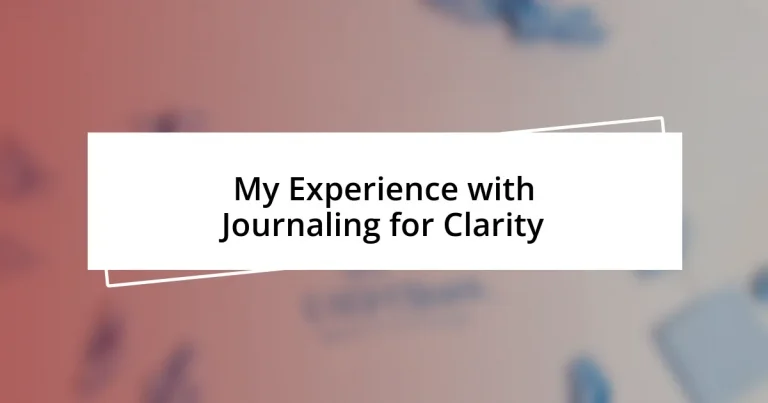Key takeaways:
- Journaling serves as a therapeutic sanctuary, enabling self-discovery and emotional clarity through free writing and reflection.
- Key benefits of journaling include stress relief, goal setting, and problem-solving, which can transform overwhelming feelings into manageable insights.
- Establishing a personal routine for journaling enhances commitment and turns the practice into a meaningful ritual.
- Real-life examples highlight how journaling reveals hidden fears and illuminates communication issues, fostering personal growth and clarity.
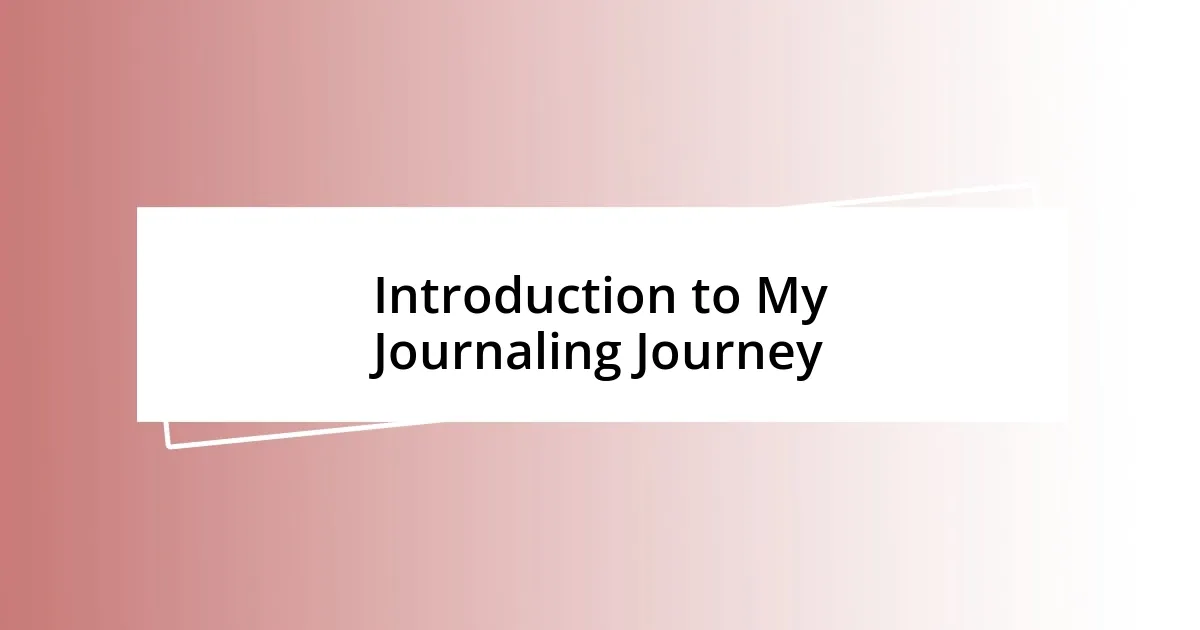
Introduction to My Journaling Journey
It all started on a rainy afternoon when I found myself overwhelmed by life’s chaos—work deadlines, personal struggles, and that nagging feeling of uncertainty. Sitting by my window, I picked up an old notebook and began to write. The pages witnessed my thoughts unfurling like a beautiful mess of tangled emotions, and I couldn’t help but wonder: what if this simple act of writing could bring clarity to my swirling mind?
As the days turned into weeks, journaling became my sanctuary, a safe space where I could freely explore my feelings without judgment. I remember scribbling furiously during a particularly stressful week; the act itself was therapeutic, like unburdening a heavy backpack. Have you ever felt like your thoughts were just racing around in your head, desperate to escape? That’s precisely how it felt, and with every word I penned, I discovered a little more about myself.
Looking back, I realize that journaling transformed not just how I dealt with stress, but also how I viewed the world. I found comfort in reflecting on my experiences and untangling my emotions, leading to surprising insights that nudged me toward personal growth. Each entry felt like a conversation with myself, where I could ask questions and find answers amidst the noise. It makes me think—what might you uncover about yourself if you embarked on this journey?
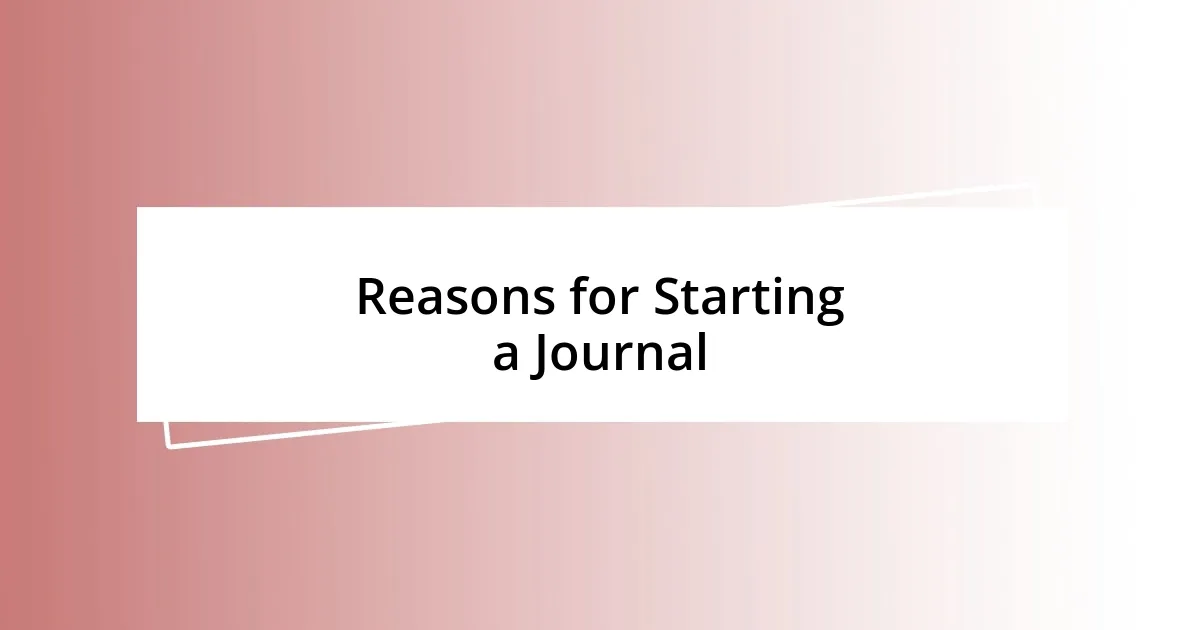
Reasons for Starting a Journal
Starting a journal can be a game-changer, particularly for those seeking to navigate life’s complexities. For me, it became a catalyst for change. I remember waking up one morning, feeling like my thoughts were a tangled web, and I turned to my journal. Just that small act of writing down my dreams and worries allowed me to clear the fog and find direction.
Here are some compelling reasons to consider beginning your own journaling journey:
- Self-Discovery: Writing helps you uncover deeper thoughts and feelings, leading to greater self-awareness.
- Stress Relief: The simple act of putting pen to paper can alleviate anxiety and manage overwhelming emotions.
- Goal Setting: Journaling allows you to articulate your aspirations, making it easier to visualize and achieve them.
- Problem-Solving: Documenting challenges can provide a fresh perspective and reveal solutions you hadn’t considered.
- Emotional Processing: By exploring your feelings on the page, you can gain clarity and cope with difficult emotions more effectively.
Each entry holds the potential to shed light on the murky areas of life that often lead to confusion and uncertainty. I’ll never forget the moment I realized that writing about my daily frustrations not only helped me process them but also made me feel less alone. It was like having a heart-to-heart with an old friend who understands, offering comfort and clarity.
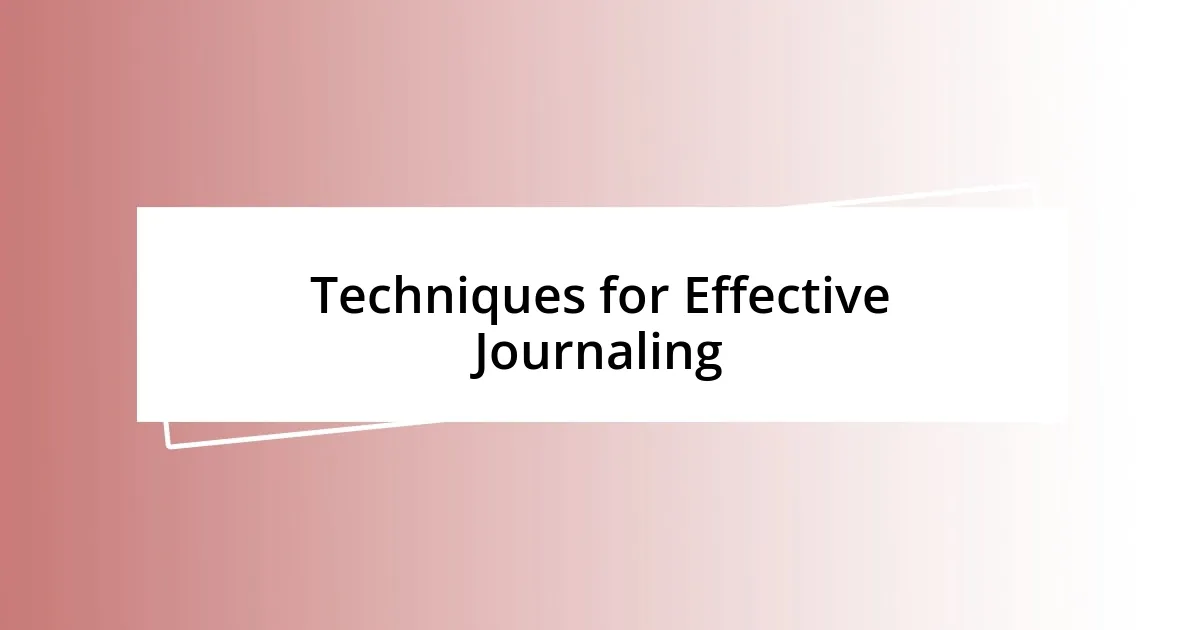
Techniques for Effective Journaling
To journal effectively, one key technique I’ve found invaluable is the practice of free writing. This involves allowing my thoughts to flow onto the page without worrying about grammar or structure. I remember one evening when I decided to write for just five minutes without stopping. The experience was liberating; I surprised myself by unearthing thoughts I didn’t even know I had! It’s amazing how this technique can unlock deeper emotions and insights when you let your pen dance across the paper without restrictions.
Another approach I’ve embraced is gratitude journaling. Each night, I take a moment to write down three things I’m thankful for. This simple exercise shifts my focus from what’s troubling me to the positive aspects of my life. I recall a particularly tough week when everything seemed to go wrong. However, once I began to acknowledge even the smallest things—like a charming cup of coffee or a friend’s message—I felt the weight of my worries lightened. It’s an emotional anchor that brings perspective during stormy days.
Lastly, I’ve found value in using prompts to guide my journaling. Occasionally, I sit down with a specific question in mind, like “What do I want to let go of?” or “What brings me joy?” These questions often spark deeper reflections. For instance, when I asked about joy, I realized how much I appreciated my morning walks. This insight not only brought happiness but also inspired me to make a conscious effort to incorporate more joyful activities into my daily routine.
| Technique | Description |
|---|---|
| Free Writing | Writing continuously for a set time without concern for structure, allowing deep thoughts to surface. |
| Gratitude Journaling | Listing things you’re thankful for, shifting focus from difficulties to positive experiences. |
| Using Prompts | Guiding your journaling with specific questions or themes to encourage deeper reflection. |
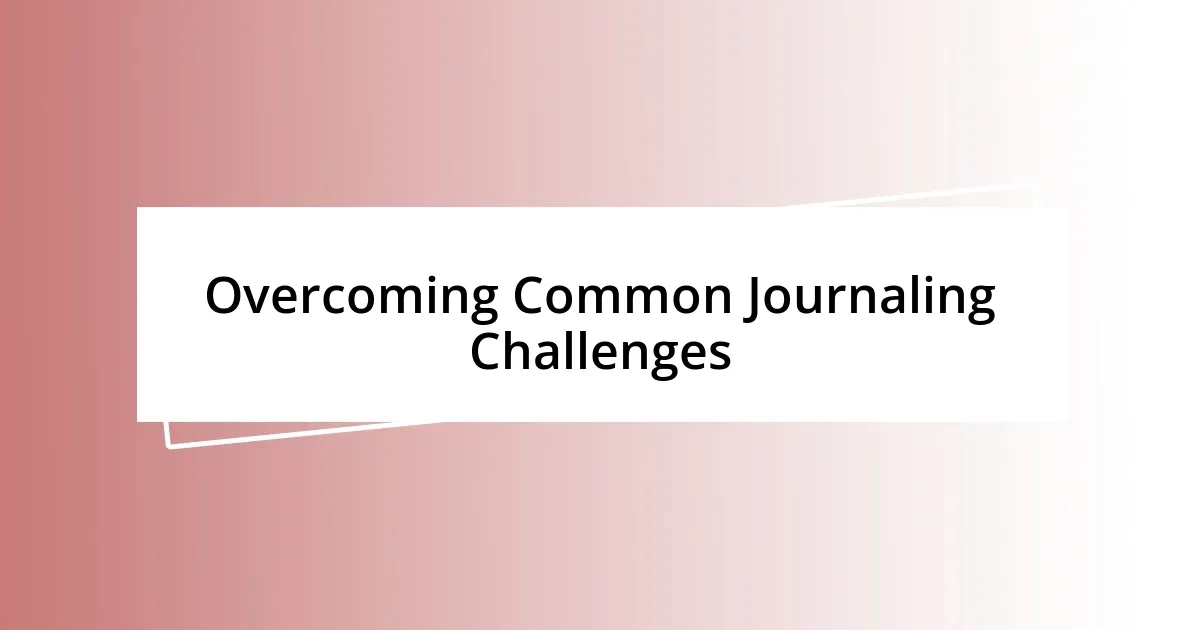
Overcoming Common Journaling Challenges
Sometimes, the biggest hurdle I faced while journaling was simply finding the time to write. Life gets busy, right? On days when my schedule felt overwhelming, I learned to carve out even just five minutes for a quick entry. I found that a small commitment was better than none; it’s amazing how a brief moment can really help to regain focus amidst chaos.
Another challenge I encountered was dealing with self-doubt. There were times I would stop writing because I felt unsure about my thoughts or how I expressed them. I had to remind myself that the journal is a judgment-free space. One evening, I flipped back through some of my early entries, and I was surprised by the raw honesty in those words. They weren’t perfect, but they were genuine, and that’s what truly mattered.
Then there’s the issue of consistency. I recognized that keeping a regular journaling routine was tough, especially when motivation ebbed. I decided to create a ritual around my writing; I’d brew a cup of my favorite tea and dim the lights to set a cozy tone. It became a cherished moment of self-care, and I found myself looking forward to those evenings. Could your journaling practice use a little ritual to enhance its allure? Developing a unique routine can make all the difference in establishing that lasting commitment.
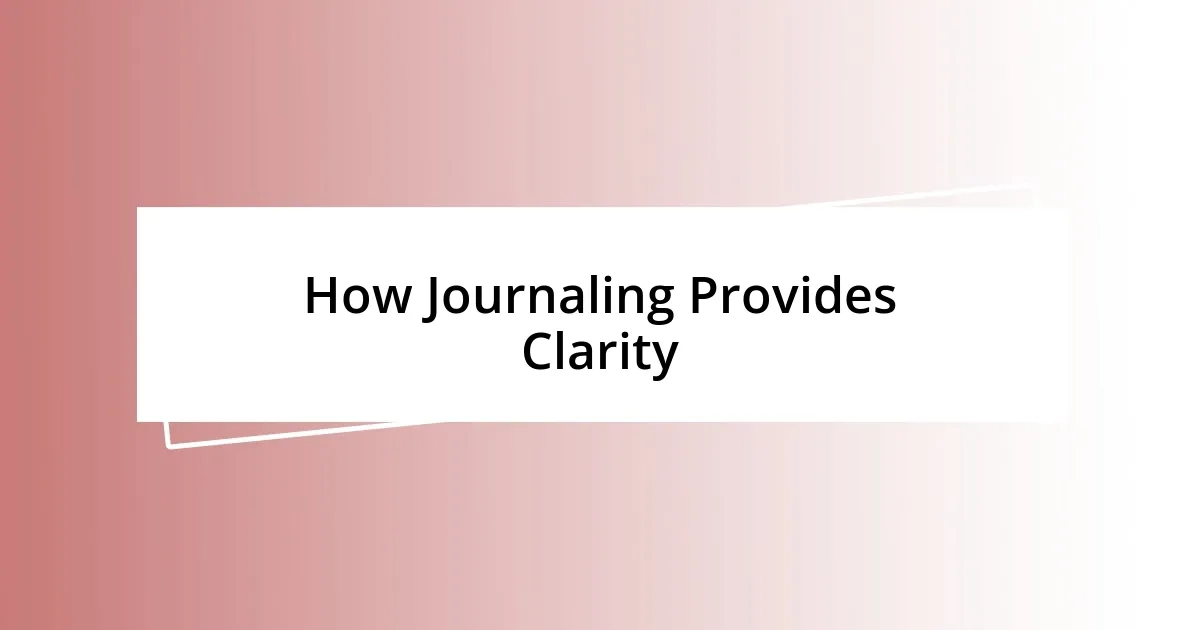
How Journaling Provides Clarity
Journaling helps me clear the mental fog that often clouds my thoughts. I remember one afternoon after a particularly hectic week at work, my mind was racing with anxious ideas. I simply sat down with my journal and began to write. Within minutes, I noticed patterns in my worries, which led me to identify the root cause of my stress—a looming project deadline. This process of unpacking my thoughts felt like a form of therapy, providing me with the clarity that I desperately needed.
As I write, I often find that my emotions surface unexpectedly. I can’t count how many times I’ve started a journal entry feeling fine, only to realize halfway through that I was grappling with feelings of sadness or frustration. I’ve learned that expressing these emotions in writing not only brings them to light but also helps me understand them better. Have you ever felt a weight lift after putting pen to paper? I certainly have; it’s as though my thoughts transform into tangible words, making the chaos in my mind more manageable.
Another benefit of journaling is that it encourages me to review my experiences thoughtfully. Recently, I reflected on a personal challenge by writing about what I learned from it. This exercise not only offered me insights into my growth but also instilled a sense of gratitude for the journey. Frequently, I ask myself, how could I have viewed this differently? Engaging in this kind of reflection allows me to turn challenges into stepping stones, making my path clearer as I move forward.
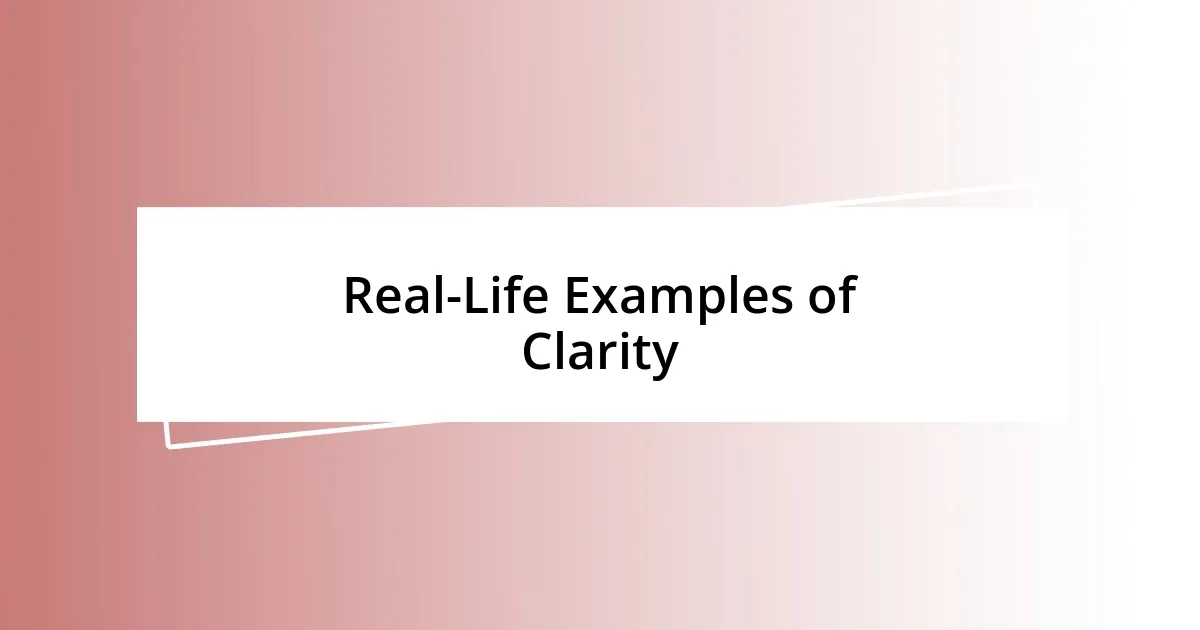
Real-Life Examples of Clarity
One striking example of clarity I experienced through journaling happened during a particularly confusing period in my life. I was grappling with a tough decision about whether to pursue a job opportunity that could uproot my entire routine. As I poured my thoughts into my journal, I uncovered a pattern: I kept writing about my fear of change. By clarifying my fears, I realized that the root of my hesitation stemmed not from the job itself, but rather from the comfort of the known. This breakthrough felt liberating. Have you ever realized that the biggest hurdles are often self-imposed?
Another memorable moment involved my relationships. I remember journal entries where I expressed frustration about communication breakdowns with a close friend. As I dissected those feelings on the page, it became clear that I wasn’t being honest about my own needs. This revelation allowed me to approach the situation with newfound courage. The clarity gained from writing made it easier to have a heartfelt conversation. Isn’t it fascinating how writing can illuminate issues that usually linger in the background?
There was also a time I felt overwhelmed by a project that had multiple components. I created a detailed list in my journal, breaking everything down into smaller tasks. I quickly realized that much of my stress was simply the result of feeling lost due to the sheer volume of work. Once these tasks were visible on the page, I could strategize and prioritize effectively, which transformed my anxiety into actionable steps. Has writing ever turned a mountain of stress into a manageable checklist for you?
